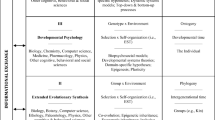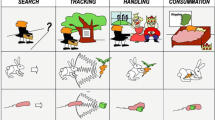Abstract
I offer support for the view that physicalist theories of cognition don't reduce to neurophysiological theories. On my view, the mind-brain relationship is to be explained in terms of evolutionary forces, some of which tug in the direction of a reductionistic mind-brain relationship, and some of which which tug in the opposite direction. This theory of forces makes possible an anti-reductionist account of the cognitive mind-brain relationship which avoids psychophysical anomalism. This theory thus also responds to the complaint which arguably lies behind the Churchlands' strongest criticisms of anti-reductionism — namely the complaint that anti-reductionists fail to supply principled explanations for the character of the mind-brain relationship. While lending support to anti-reductionism, the view defended here also insures a permanent place for mind-brain reduction as an explanatory ideal analogous to Newtonian inertial motion or Aristotelian natural motion.
Similar content being viewed by others
References
Anderson, J. R.: 1983, The Architecture of Cognition, Harvard University Press, Cambridge, Massachusetts.
Bever, T. G.: 1970, ‘The Cognitive Basis for Linguistic Structures’, in J. R. Hayes (ed.), Cognition and the Development of Language, John Wiley, New York.
Burge, T.: 1979, ‘Individualism and the Mental’, Midwest Studies in Philosophy 4, 73–121.
Chomsky, N. and H. Lasnik: 1977, ‘Filters and Control’, Linguistic Inquiry 8, 425–504.
Churchland, P. M.: 1981, ‘Eliminative Materialism and the Propositional Attitudes’, The Journal of Philosophy 78, 67–90.
Churchland, P. M.: 1982, ‘Is Thinker a Natural Kind?’, Dialogue 21, 223–38.
Churchland, P. S.: 1986, Neurophilosophy, MIT Press, Cambridge, Massachusetts.
Clark, E.: 1987, ‘The Principle of Contrast: A Constraint on Language Acquisition’, in B. MacWhinney (ed.), Mechanisms of Language Acquisition, Erlbaum Associates, Hillsdale, New Jersey.
Clark, H. H. and E. V. Clark: 1977, Psychology and Language, Harcourt Brace Jovanovich, New York.
Cummins, R.: 1983, The Nature of Psychological Explanation, MIT Press, Cambridge, Massachusetts.
Davidson, D.: 1970, ‘Mental Events’, in L. Foster and J. W. Swanson (eds.), Experience and Theory, University of Massachusetts Press, Amherst.
Dretske, F.: 1981, Knowledge and the Flow of Information, MIT Press, Cambridge, Massachusetts.
Enç, B.: 1983, ‘In Defense of the Identity Theory’, The Journal of Philosophy 80, 279–98.
Enç, B.: 1986, ‘Essentialism without Individual Essences: Causation, Kinds and Restricted Identities’, Midwest Studies in Philosophy 9, 403–26.
Fodor, J. A.: 1974, ‘Special Sciences’, Synthese 28, 77–115.
Fodor, J. A.: 1975, The Language of Thought, Crowell, New York.
Fodor, J. A.: 1980, ‘Methodological Solipsism Considered as a Research Strategy in Cognitive Psychology, The Behavioral and Brain Sciences 3, 63–109.
Fodor, J. A.: 1981, ‘The Present Status of the Innateness Controversy’, in J. A. Fodor, Representations, MIT Press, Cambridge, Massachusetts.
Fodor, J. A.: 1983, The Modularity of Mind, MIT Press, Cambridge, Massachusetts.
Fodor, J. A.: 1986, ‘Banish disContent’, in J. Butterfield (ed.), Language, Mind and Logic, Cambridge University Press, Cambridge.
Fodor, J. A.: 1987, Psychosemantics, MIT Press, Cambridge, Massachusetts.
Fodor, J. D., J. A. Fodor, and M. F. Garrett: 1975, ‘The Psychological Unreality of Semantic Representations’, Linguistic Inquiry 6, 515–31.
Fodor, J. A., M. F. Garrett, E. C. T. Walker, and C. H. Parkes: 1980, ‘Against Definitions’, Cognition 8, 263–367.
Fodor, J. D.: 1984, ‘Constraints on Gaps: Is the Parser a Significant Influence?’, in B. Comrie and O. Dahl (eds.), Explanations for Language Universals, Mouton, Berlin.
Gardner, M. R.: 1979, ‘Realism and Instrumentalism in 19th-Century Atomism’, Philosophy of Science 46, 1–34.
Gould, S. J.: 1980, ‘Natural Selection and the Human Brain: Darwin vs. Wallace’, in The Panda's Thumb, W. W. Norton, New York.
Gould, S. J. and R. Lewontin: 1979, ‘The Spandrals of San Marco and the Panglossian Paradigm: A Critique of the Adaptationist Programme’, Proceedings of the Royal Society of London 205, 581–98.
Grimshaw, J.: 1981, ‘Form, Function, and the Language Acquisition Device’, in C. L. Baker and J. J. McCarthy (eds.), The Logical Problem of Language Acquisition, MIT Press, Cambridge, Massachusetts.
Haber, R. N. and M. Hershenson: 1980, The Psychology of Visual Perception, Holt, Rinehart and Winston, New York.
Haugeland, J.: 1985, Artificial Intelligence: The Very Idea, MIT Press, Cambridge, Massachusetts.
Hubel, D. H. and T. N. Wiesel: 1979, ‘Brain Mechanisms of Vision’, The Brain: a “Scientific American” book, W. H. Freeman, San Francisco.
Jackendoff, R.: 1978, ‘Grammar as Evidence for Conceptual Structure’, in M. Halle, J. Bresnan, and G. Miller (eds.), Linguistic Theory and Psychological Reality, MIT Press, Cambridge, Massachusetts.
Johnson-Laird, P.: 1983, Mental Models, Harvard University Press, Cambridge, Massachusetts.
Kim, J.: 1989, ‘The Myth of Nonreductive Materialism’, Proceedings and Addresses of the American Philosophical Association 63, 31–47.
Kripke, S.: 1972, ‘Naming and Necessity’, in G. Harmon and D. Davidson (eds.), Semantics of Natural Language, D. Reidel, Dordrecht.
Liberman, A., F. S. Cooper, D. P. Shankweiler, and M. Studdert-Kennedy: 1967, ‘Perception of the Speech Code’, Psychological Review 74, 431–61.
Macnamara, J.: 1982, Names for Things, MIT Press, Cambridge, Massachusetts.
Marr, D.: 1982, Vision, W. H. Freeman, New York.
Miller, G. A.: 1956, ‘The Magical Number Seven, Plus or Minus Two: Some Limits On Our Capacity for Processing Information’, Psychological Review 63, 81–97.
Mucciolo, L. F.: 1974, ‘The Identity Thesis and Neuropsychology’, Noûs 8, 327–42.
Palmer, S. E.: 1978, ‘Fundamental Aspects of Cognitive Representation’, in E. Rosch, and B. Lloyd (eds.), Cognition and Categorization, Erlbaum Associates, Hillsdale, New Jersey.
Perry, J.: 1979, ‘The Problem of the Essential Indexical’, Noûs 13.
Pinker, S.: 1987, ‘The Bootstrapping Problem in Language Acquisition’, in B. MacWhinney (ed.), Mechanisms of Language Acquisition, Erlbaum Associates, Hillsdale, New Jersey.
Putnam, H.: 1975, ‘The Meaning of “Meaning”’, in Mind, Language and Reality; Philosophical Papers, Cambridge University Press, Cambridge.
Pylyshyn, Z.: 1984, Computation and Cognition, MIT Press, Cambridge, Massachusetts.
Quine, W. V. O.: 1953, ‘Two Dogmas of Empiricism’, in From a Logical Point of View, Harper and Row, New York.
Sober, E.: 1984, The Nature of Selection, MIT Press, Cambridge, Massachusetts.
Stich, S.: 1983, From Folk Psychology to Cognitive Science, MIT Press, Cambridge, Massachusetts.
Vygotsky, L.: 1986, Thought and Language, MIT Press, Cambridge, Massachusetts.
Wittgenstein, L.: 1953, Philosophical Investigations, Basil Blackwell, Oxford.
Author information
Authors and Affiliations
Additional information
I wish to thank the Synthese referees for their comments and suggestions. I also wish to thank Steve Bowen, Elise Brenner, and Arthur Fine for helpful discussions and Joseph Owens for his comments on a version of this paper read at the Central Division Meetings of the American Philosophical Association held in Cincinnati in April 1988.
Rights and permissions
About this article
Cite this article
Montgomery, R. The reductionist ideal in cognitive psychology. Synthese 85, 279–314 (1990). https://doi.org/10.1007/BF00484795
Issue Date:
DOI: https://doi.org/10.1007/BF00484795




